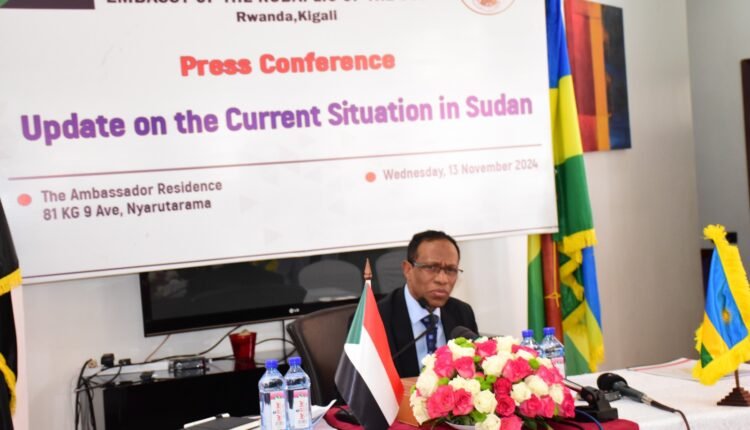In its Press Conference, the Sudan Embassy in Rwanda Highlights RSF Violations

Kigali – Sudanhorizon
On Wednesday, the Sudanese Embassy in Rwanda held a press conference on the situation in Sudan and the violations committed by the Rapid Support Forces (RSF). The event was attended by 29 journalists from 20 media outlets, including channels, newspapers, radio stations, and Rwanda’s national broadcasting authority.
Ambassador Khalid Musa provided a detailed account of the RSF’s violations, highlighting crimes such as ethnic cleansing, war crimes, and crimes against humanity, with incidents occurring across Sudan, most recently in East Al-Jazira. He described the resulting humanitarian crisis as one of the largest in the world, urging African media to break the silence on what he called Sudan’s “forgotten war,” a situation that pricks the African conscience and turns the phrase “African solutions for African problems” into a mere slogan.
He emphasized that the involvement of certain regional powers and neighbouring countries in supporting the rebel militia is a significant factor in prolonging the conflict and the atrocities committed against civilians, especially through the recruitment of mercenaries and the provision of weapons and military equipment. He called on these countries to heed reason and halt the flow of military support through their territories to the militia in Sudan, warning that the war’s impact would not be confined to Sudan’s borders but would threaten regional stability as a whole.
Ambassador Musa noted that Sudan is open to all peace initiatives. Still, the Jeddah Declaration of Principles is the foundation for peace, provided that the rebel militia adheres to its terms, particularly by vacating civilian properties and consolidating militia forces in agreed-upon camps. He stated that forming a unified national army by integrating all factions guarantees national unity and is a cornerstone of Sudan’s stability.
In response to journalists’ questions, he praised Rwanda’s historical role in peacekeeping in Darfur in 2003, adding that Sudan, as part of the friendship and growing relations between the two countries, would consider Rwanda’s involvement in any agreed-upon African initiatives for peace. He also commended President Kagame’s wise leadership in resolving African conflicts. He highlighted the political understanding between the Chairman of Sudan’s Sovereign Council, General Abdel Fattah al-Burhan, and President Kagame.
Ambassador Khalid Musa also discussed the anticipated U.S. role in achieving peace in Sudan after Trump’s victory. He pointed out that the Biden administration had not taken adequate steps to halt the war, especially by pressuring the UAE, the RSF’s main supporter. He stressed the need for the newly elected administration to take objective measures to stop the war to maintain stability in the Horn of Africa rather than treating Sudan’s issue within the framework of Middle Eastern geopolitical settlements, often involving well-known compromises.
The ambassador praised the Sudanese people’s sacrifices in supporting the armed forces and outlined the state’s efforts in humanitarian aid, healthcare, and tackling challenges, particularly in managing a wartime economy, restoring basic services in certain areas, and continuing educational activities.
He urged the international community to classify the militia as a terrorist organization and to implement accountability for the violations and crimes committed against civilians.
Shortlink: https://sudanhorizon.com/?p=2593

